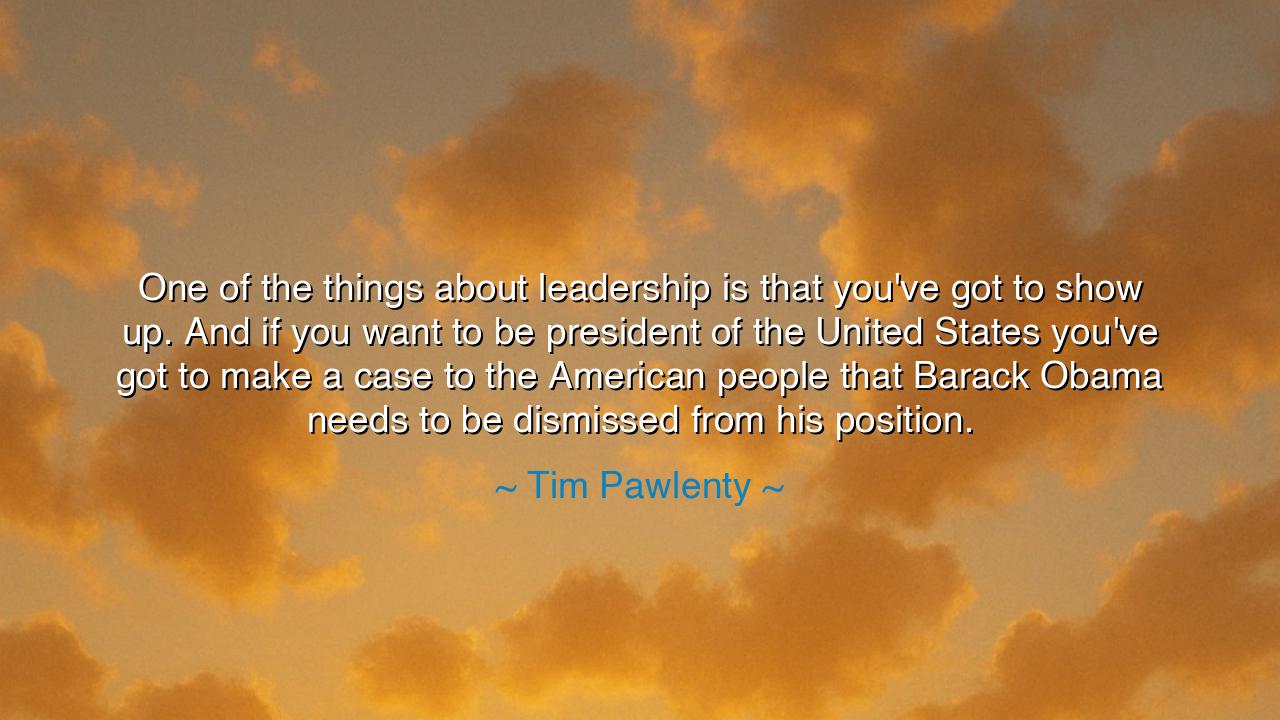
One of the things about leadership is that you've got to show up.
One of the things about leadership is that you've got to show up. And if you want to be president of the United States you've got to make a case to the American people that Barack Obama needs to be dismissed from his position.






The words of Tim Pawlenty—“One of the things about leadership is that you've got to show up. And if you want to be president of the United States you've got to make a case to the American people that Barack Obama needs to be dismissed from his position”—carry within them a timeless lesson about presence, courage, and conviction. Though spoken in the realm of politics, their meaning reaches far beyond campaigns and elections; they speak to the very essence of what it means to lead, to stand forth when others waver, and to embody responsibility not through words alone, but through action. Pawlenty reminds us that leadership begins not with position, but with presence—for the leader who does not show up cannot be followed, and the one who avoids challenge cannot command respect.
To “show up” is no simple phrase. It is the soul’s declaration of readiness—to face scrutiny, to bear the weight of decision, and to be seen as one truly is. Many desire power, but few are willing to be present in the full heat of accountability. The true leader, however, stands before his people and says, “Judge me by my deeds.” Pawlenty’s statement came at a time of political contest, yet it reveals a universal truth: leadership is not granted by title or inheritance, but earned by courage in visibility. To show up is to risk failure; it is to step into the light and accept the burden of proving one’s worth.
The origin of Pawlenty’s words lies in the fierce theater of American democracy, where each generation must renew the sacred dialogue between the governed and those who would govern. His challenge was not only to himself, but to all who aspire to lead—to make a case, not merely to speak of ambition, but to persuade through vision, integrity, and purpose. In saying that one must “make a case to the American people,” he invoked one of the oldest truths in the republic: that authority flows from the consent of the governed, and that a leader must earn that consent through reason and conviction. His words are the echo of an ancient principle—the principle that power without justification is tyranny, and that true leadership is born from the trust freely given by a discerning people.
History offers shining examples of this kind of leadership through presence and persuasion. Consider Abraham Lincoln, who in the turbulent years before the Civil War, stood before a divided nation and made his case—not with fury, but with moral clarity. He showed up when others retreated into fear, and though the burden of leadership pressed heavily upon him, he did not turn away. His debates, his writings, and his actions were his argument to the American people—that slavery must end, that the Union must endure, and that freedom must remain the soul of the nation. Through his steadfast presence, he turned belief into movement and conviction into destiny.
Contrast this with those who have faltered by failing to “show up.” History remembers not only the brave, but also the absent. In times of crisis, when the world trembles, the absence of leadership breeds chaos. The fall of the Roman Republic was hastened not merely by corruption, but by withdrawal—when men of wisdom chose silence over service, retreating into comfort while ambition and deceit filled the vacuum. Pawlenty’s warning thus speaks to every age: when good men fail to appear, lesser men take the stage. Leadership, then, is not only an opportunity but an obligation—to stand, to speak, to act when it matters most.
The lesson in these words is clear: do not wait for the perfect moment, for the perfect conditions, or the perfect confidence. Show up—in your work, in your faith, in your service to others. The leader, like the warrior, must face the field as it is, not as he wishes it to be. To “make your case” is to speak with authenticity, to offer your truth, and to accept the verdict of those you serve. Whether in politics, in family, or in the quiet leadership of daily life, every person is called to show up and stand accountable before the circle of their influence.
Therefore, let these words of Tim Pawlenty be heard not as a political challenge, but as a summons to the human spirit. For in every life, there comes a moment when one must step forth—to defend one’s beliefs, to guide others, to bear the weight of choice. When that moment comes, do not shrink away into silence or fear. Remember: leadership begins with presence, and greatness begins with the courage to be seen. The one who shows up, though uncertain, already stands higher than the one who hides behind excuses. And as long as there are those willing to rise and face the light, the flame of true leadership will never die from the earth.






AAdministratorAdministrator
Welcome, honored guests. Please leave a comment, we will respond soon